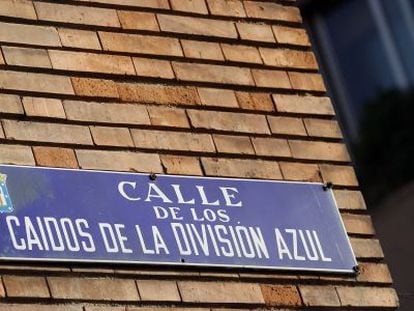Madrid starts removing Francoist monuments without warning
Angry citizens sit on stone memorial to prevent city workers from taking it away by truck

With no prior warning, the city of Madrid has begun tearing down its remaining monuments dedicated to figures and entities connected to the Franco dictatorship.
On Monday, workers took down a stone memorial to Spanish army officers located in the Jerónimos neighborhood, without first informing the Madrid Heritage Committee. The piece paid tribute to officers who served under the military rank of alférez provisional (provisional second lieutenant).
Also on Monday, a headstone put up in memory of the right-wing unionist José García Vara, who was assassinated in an ambush in 1935, was removed.
“You can’t just take down monuments like this, regardless of whether you like them or not”
Before that, on Friday of last week, city workers took away a plaque in the Carabanchel district commemorating the execution by leftist forces of eight Carmelite friars in 1936.
And the city has now revealed plans to do away with five other memorials, including two in honor of José Calvo Sotelo, a right-wing deputy who was killed in 1936 by members of the Republican Assault Guard.
When the leftist citizen platform Ahora Madrid successfully took over the city council from the long-ruling Popular Party (PP) conservatives after the May 2015 elections, one of its promises was to eliminate all “Francoist vestiges” from the city streets, in compliance with the Historical Memory Law that Congress passed in 2007.
But not everyone in Madrid is happy about the move. On Monday, workers who took down the monolith in Jerónimos attempted to load both sections into a truck, but met with opposition from several individuals who had gathered at the scene.
Street names up for change
On December 22, Madrid City Hall approved a Socialist proposal to change at least "30 street names referencing the Franco dictatorship."
The initiative met with support from Ahora Madrid and Ciudadanos, but received a no vote from the PP. The local government is now working on a “memory plan” to implement the project.
Ultimately, the workers drove away, leaving the sections lying on the grass. Somebody later covered the downed monument with a Spanish flag.
A witness told EL PAÍS that one of the protesters sat on top of the stone memorial to prevent workers from taking it away. The latter called the police, but then decided to leave before the patrol car showed up.
The monolith, which had been in place since 1960, is a tribute to a military category – alférez provisional, or second lieutenant – explains Antonio Morcillo of Gefrema, an association that works to preserve Madrid’s Civil War heritage.
“There were a great many of them who came out of the academies with a very basic military training, with no experience, and who were placed in command of troops,” says Morcilla. Their lack of know-how led to huge casualties. “Most of them did not make it past their first battle.”
This scholar opposes the elimination of such memorials. “Deleting the things that reflect the history of either side seems to me like an atrocious thing to do.”
“Completely perplexed”
The Socialist spokeswoman for cultural affairs, councilor Mar Espinar, says she feels “completely perplexed” at the city’s decision to remove the monument.
“You can’t just take down monuments like this, regardless of whether you like them or not,” she said. “The choice of plaques, sculptures or memorials set for elimination must first go through the city’s Culture Committee, which must greenlight the move after analyzing each case.”
Espinar said her party had no official knowledge of what the Manuela Carmena administration was up to. “There are no reports on the subject,” she said.
But government sources deny that they are removing monuments without warning. “The culture commissioner [Celia Mayer] announced it at the December 22 plenary session,” said one source.
English version by Susana Urra.











































